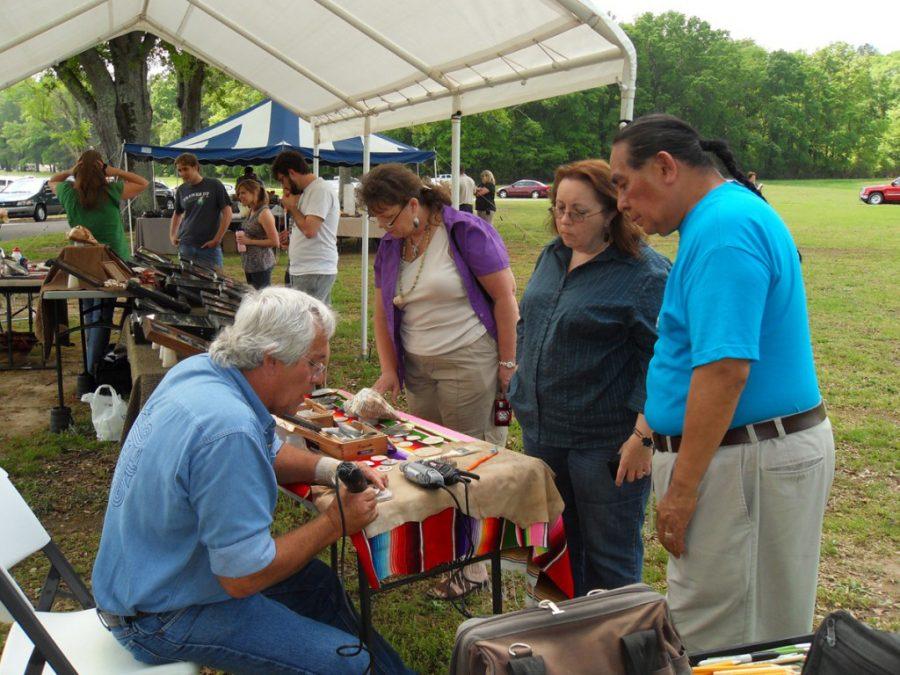Though the mounds date all the way back from A.D. 1450, this year marks the 27th Moundville Native American Festival, and it’s just a short 30-minute drive from Tuscaloosa. These hulking monuments, officially known as the historical Moundville site, set the stage for the annual celebration, which began yesterday and runs through Saturday, Oct. 10.
“I knew I was Indian, but I didn’t know what that meant nor at the time did I not know why I had not been instilled with the pride I now have. My dad or my grandmother never talked about our “Indian-ness” even though we were noticeably dark and different. Later I would realize that stereotypes, racism, and other factors led them to not passing anything down, as it has done to so many through history,” flutist Brad Clonch said.
Clonch was gifted a flute one day by a Chickasaw woman, and hasn’t been the same since. Despite being a composer and piano player, he believes that playing the Southeastern Indian flute is very different.
“Traditional Native American music was played from the heart,” he said. “It wasn’t something that was composed, notated and scored out for others to mass produce much like we think of Classical music. It was played from the soul. We still do that today…it is drawn from experiences from the homelands, from history, from our perceptions.”
The festival started in 1989 as part of the 50th anniversary of the park’s opening, with a small circle of people demonstrated aspects of different cultures such as Choctaw, Cherokee, Chickasaw and Muscogee, specifically Creek and Seminole.
“When different cultures make contact with one another, ideas, customs, etc. end up being shared. The cultures of the Southeast are no exception. Take for example what we think of as southern food. Greens, black eyed peas, squash, cornbread—we wouldn’t have any of those things if we’d never made contact with Native Americans. In that sense, these things are important parts of Alabama’s heritage,” said Betsy Irwin, interim director of the park.
One of the main performers is award-winning band Injunuity. Their music blends traditional Native American flute with modern instruments like drums and guitar, thus their slogan “Not Your Grandfather’s Flute Music.” However, the band members were not always in touch with their native ancestry.
“I’m sure our flute music will have evolved and changed,” Clonch said. “From first contact in the 1500s with Spanish… our people have learned to adapt, incorporate, and integrate. We stay true by using our music to tell and weave an experience or connection to the past. To me that’s honoring our past. That is another reason we decided to call ourselves Injunuity…the modern aspect is combining and integrating other cultural instruments such as the piano, strings, percussion, guitar, etc. At one time 1000’s of years ago, someone introduced the flute, the drum, and it was “new” and not traditional, but modern and edgy!”
Many people today have a distinct idea of what constitutes Native American—headdresses, tipis, and a somewhat ascetic, natural lifestyle among other things. When these are not present or when Native Americans have assimilated into American society through clothing and other aspects, native peoples are dismissed as fakes, or worse. Injunuity seeks to dispel these myths, and asserts that adaptation does not mean that they have lost who they are, but that they are merely adding their own experiences into their music.
Another performer is storyteller and dancer Amy Bluemel, member of the Chickasaw tribe. She grew up hearing traditional stories, then eventually started telling them herself. She emphasizes the importance of retaining this tradition.
“Oral history is very important to native people because we didn’t have written languages,” Bluemel said.So a lot of the stories were passed down by elders and we’re still trying to do that and preserve the stories that we still have,” “A lot of times those stories have a moral to them…and then I also tell stories about the Trail of Tears or why we wear the clothes we wear…so that you get a broad picture and a little taste of all different things in my stories.”
She dances with the Chickasha Hithla stomp dancing group as well, which Bluemel says is very important to Chickasaw society and is some of the oldest dancing done in North America. Bluemel loves coming to Moundville and appreciates the importance of educating others in Southeastern native culture.
“The energy there is fantastic and the knowledge that this is where the people came from definitely…touches a place in you…I’d say it’s one of my favorite places on the planet,” Bluemel said. “Most of the native people were moved so…even though you have a lot of words that were ours like Tuscaloosa and things like that, people don’t know what they are because there isn’t a native presence there all the time. So I think the festival serves a great deal to the community about what was here before.”
Lyndon Alec, a member of the Alabama-Coushatta, is another dancer, famous for his hoop dance. He emphasizes above all the education purpose the festival serves and the differences between each tribe, as well as the expression of his tribe’s culture through his dance.
“I enjoy the hoop dance to share our culture…the meaning of hoop dancing is the beautiful creation that God has given us in this world, such as the trees, plants and animals for us to survive,” Alec said. “There are many tribes coming to Moundville to share their history and culture…each tribe is different in their history and what [their] ancestors went through…this is where we come in to educate. It’s an honor to finally see that we as Native Americans are finally recognized all over the world…speaking for myself, I am humbled and honored that I am a part of Moundville.”









